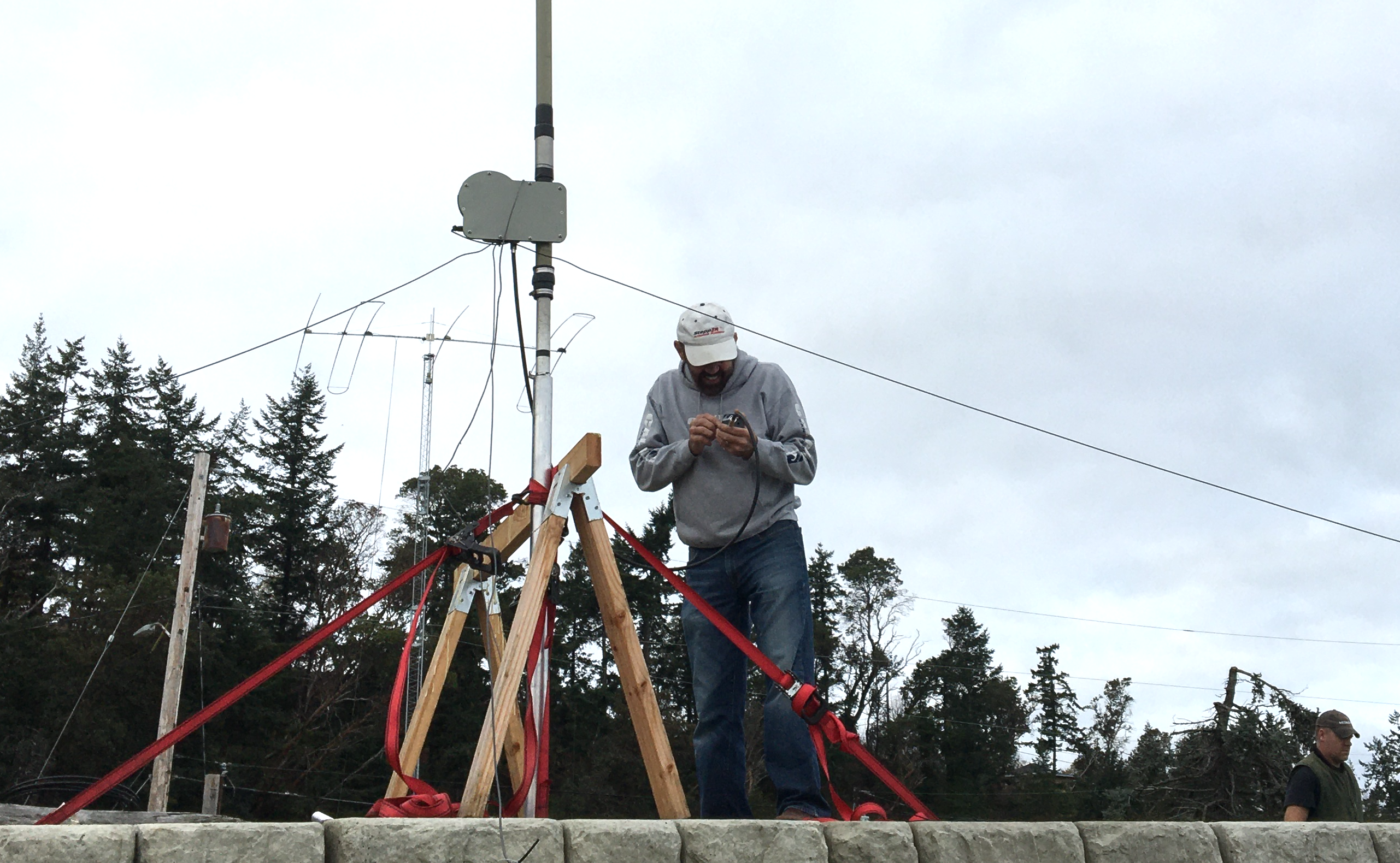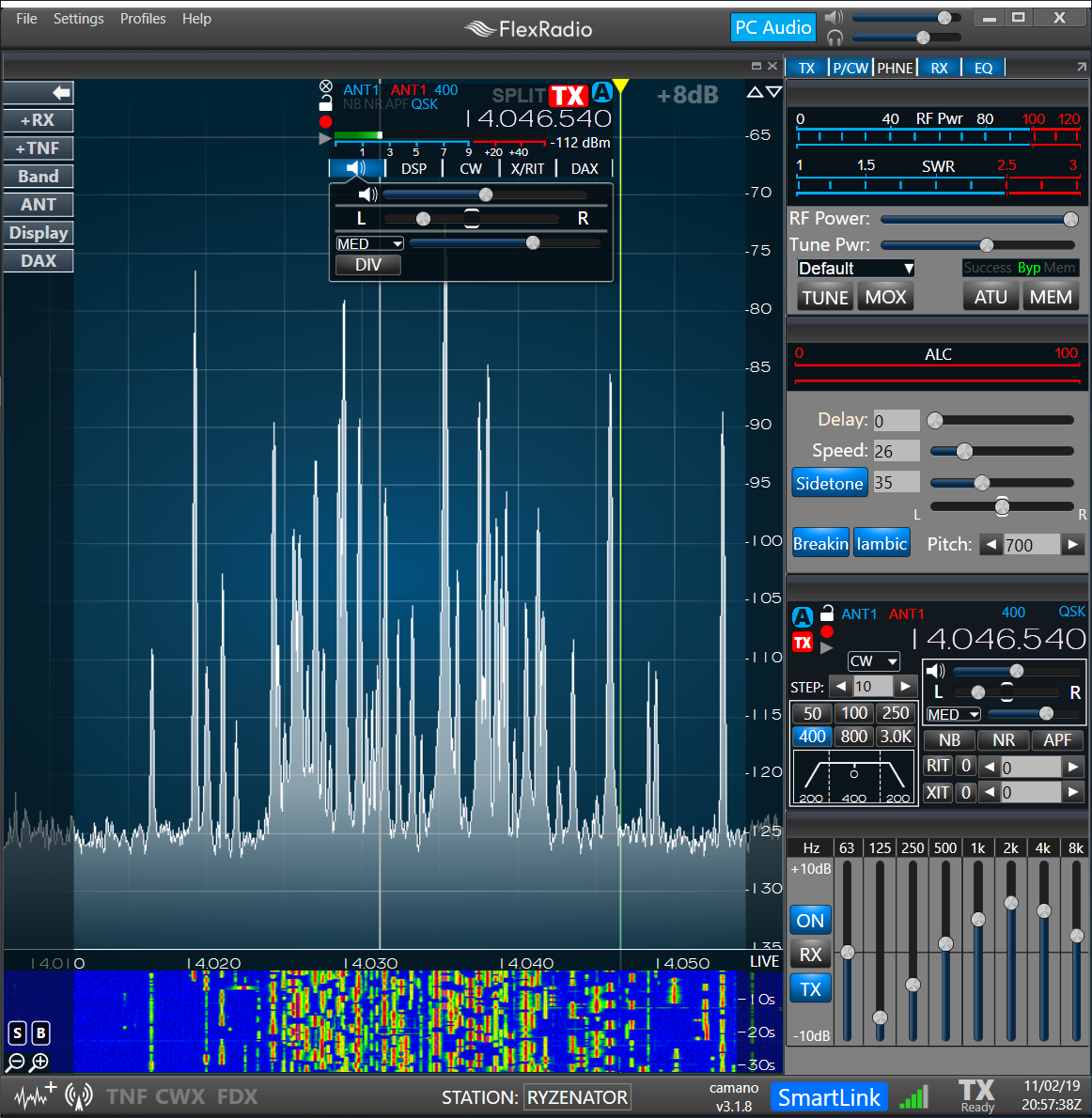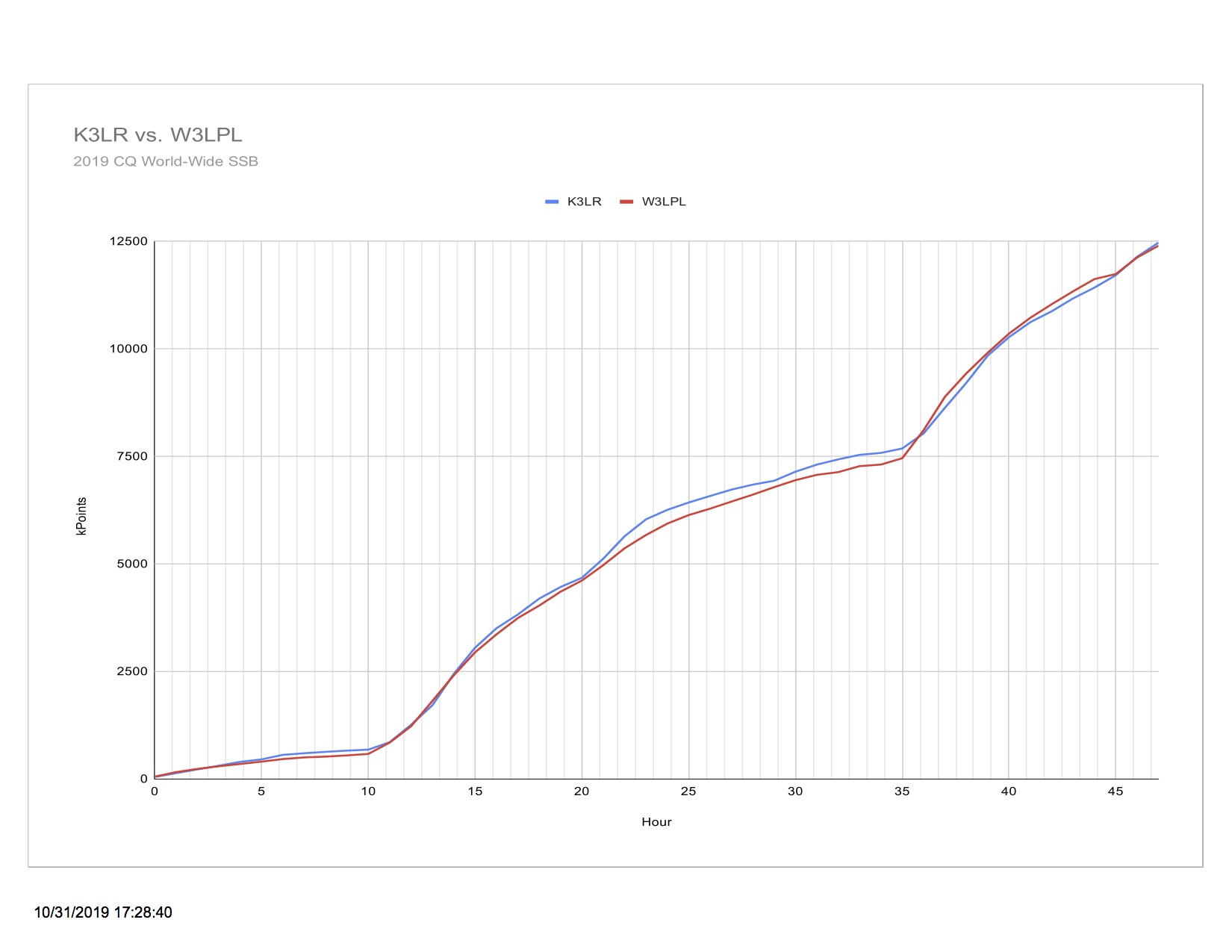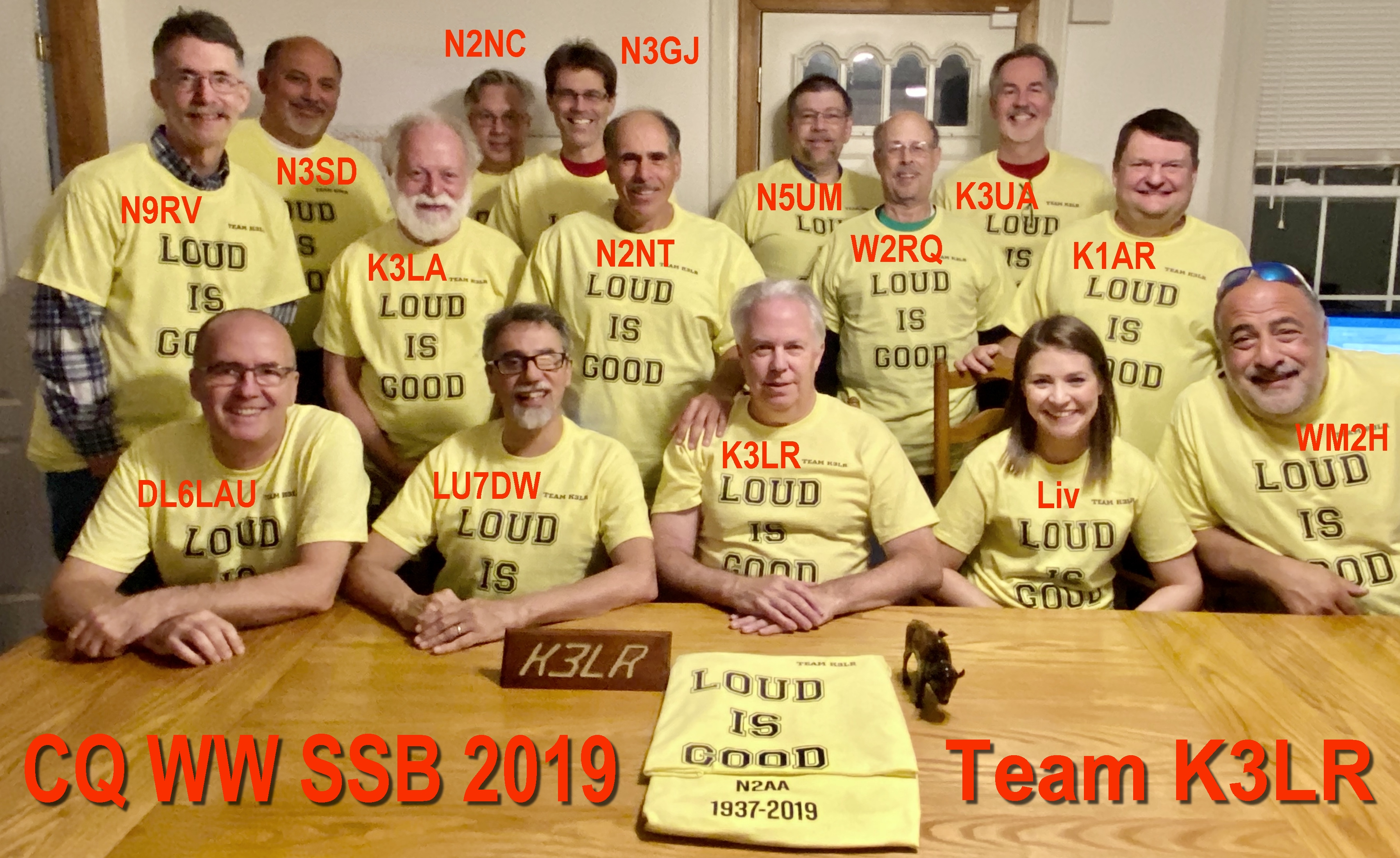 November 13, 2019 Editor: Paul Bourque, N1SFE | |||||
IN THIS ISSUE
The next 2 weeks contain a couple of the most popular contests of the year. First up is the ARRL Phone Sweepstakes on November 16-17, followed by the CQ World Wide CW Contest November 23-24. Sweepstakes is a domestic contest with a challenging exchange and 83 ARRL/RAC multipliers that can be worked once per contest over 24 operating hours out of a 30-hour contest period. The top single operator high-power score in the ARRL Phone Sweepstakes in 2018 was made by K5TR, who had 2,143 contacts, all 83 multipliers, and a score of nearly 356,000 points. The 48-hour CQ WW CW contest has zone and country multipliers, and they can all be worked once per band for multiplier credit. Lots of per-band multipliers mean big scores - last year, the top single operator high-power score by CT1BOH (at D41CV) had 693 combined multipliers and 8,743 contacts, for a score just shy of 17 million points. CQ WW is usually a great opportunity to work some juicy DX if the bands are open. Complete information for all contests follows the Conversation section 14 Nov - 27 Nov 2019 November 13 November 15 November 16
November 17 November 18 November 20 November 21 November 22 November 23 November 25 November 26 November 27
Haven't tried ARRL Phone Sweepstakes yet? This is the weekend! Check out the 2019 ARRL November Sweepstakes package for everything you need to get started. The exchange is several mouthfuls, but the challenge is worth it. Just make sure you're sending all of the exchange information, which includes your call in it. Yes, it seems redundant, but it's required. If you have limited time but can choose when you can operate, try calling CQ on Sunday, mid-morning to afternoon. You'll be "fresh meat," and be plenty busy responding to callers. It might help to have the ARRL Section List handy if you're not familiar with all of the abbreviations for them. You can watch your score versus others using one of the online contest scoreboards (like https://contestonlinescore.com or http://cqcontest.net), report your score on 3830scores.com, and then send in your log within 7 days. N1MM Logger+ now has official translations for Italian, Dutch, German, Polish, Portugese (Brazil), Slovenian, and now Spanish! According to the translation coordinator AB2ZY's post in the N1MM Logger+ group: "A Spanish language translation is now available from Tools...Download and install language pack. Be sure to thank EA5WA Juan Carlos, EB1TR Fabian, EA4TV Jaime Robles, EA2CW Mikel Berrocal for their outstanding effort!" (via Twitter and Groups.io) The digital edition of the December 2019 issue of QST may already be available by the time you read this, and it contains the 2019 ARRL Field Day results! According to results article author Paul, N1SFE, more than 36,000 operators participated across all 83 ARRL/RAC sections. Nearly 1.1 million contacts were made during the 24-hour event. "Soapbox" comments for the 2019 operating event are also available on the new contests.arrl.org website. Elecraft's October 2019 newsletter suggests that if you'd like a new K3S transceiver, you shouldn't wait. They are discontinuing the K3S after their current stock is sold, in anticipation of the Elecraft K4's arrival later this year. Although the sun rotates in about 27 days, different latitudes of the sun rotate with different periods. This is why propagation repeats about every 27 days. Here's an explainer from NASA. (Courtesy of N2IC via N0AX) Nomophobia: The fear of being without, or not being able to use, your cellular phone. The World Wide Radio Operator Foundation's Webinar "CQ WW SSB and CW - Current News on Your Favorite Contests" is on YouTube. "CQWW Director K1AR brings us up to date on the biggest annual global radiosport events on the calendar. Participant resources are examined along with log submittal, Log Check Reports, the Scores Database and awards. There are questions with answers at the end."
Disconnecting antennas from equipment is just one of the steps you might want to take to prevent damage from nearby lightning strikes. Mike, VA3MW, posted a link to K4FWJ's video on how he mechanically disconnects his remote station's equipment without "being there."
The recent CQ WW Phone contest saw a clash of the Titans - W3LPL versus K3LR battling for position. It was neck and neck throughout the 48 hours of the contest, and when the ether calmed, it was too close to call. According to Tim, K3LR: "There is no time to rest in a 48-hour contest - every minute counts!" (Tim, K3LR)
The 2019 IARU HF World Championship contest results have just gone live the on contests.arrl.org landing page. This contest has competition not just between radio operators and their stations, but also between special IARU headquarters stations, and in some years has a symbiotic relationship with the WRTC competition. This year, over 4,000 logs were submitted, and some areas of the US were even favored with transcontinental activity on 10 meters! Pizza Lovers 259, sponsors of the Makrothen RTTY Contest, announce the results of the 2019 contest. All contest participants can download the LCR and a customized certificate from the website. Next year's contest will be on October 10 and 11, 2020 with the same three time-slot format. Raw claimed scores for the 2019 CQ World Wide SSB contest are now available. (John, K1AR, via CQ-Contest) Single Band Entry Subtlety If you're entering a single band category (for example, in the ARRL International DX Contest), it is okay to also work stations on other bands. For example, if you're going to compete in the Single Op Single Band 40 meter category, it's okay to work stations on 20 meters. They won't count toward your 40 meter score, since the contest sponsor will just ignore the 20 meter contacts during scoring. But, ethically you cannot contact stations on 20 meters, and ask them to move to 40 meters to give you a contact. This is something to keep in mind if you start as SOAB, and then decide to change later. It's a little late for last week's Frequency Monitoring Test, but... if you're a Flex Radio user and want to try a future ARRL Frequency Measurement Test you should read this article by WB2WGH, which will give you a big leg up in the competition. According to Mike, VA3MW: "... Ron has written up a great procedure to allow you be within a 1 Hz measurement." Mark, K6UFO, found an article on researchers using Machine Learning to predict where lightning will next strike. Once their model was trained, their window of detection is 10 to 30 minutes within a 30 kilometer radius, using only atmospheric pressure, air temperature, relative humidity, and wind speed from local weather stations. The title of the website article is intriguing: "Convert Radio Waves to Alerts using SDR, AWS Lambda and Amazon Transcribe." The first two words of the article are "Ham Radio", and then go on to describe a way to capture audio from an SDR dongle running ham2mon on a Linux computer, pipe the received audio through a voice recognition process running in the Amazon cloud which looks for a particular phrase, and then generates an alert event in another computer system. While the particular application may not be something you're looking for, it's great to know about the building blocks, some of which might be useful in a quest to develop an SSB Skimmer. Brian, K6STI, has updated his Microsoft Windows program Coil Inductance & Q Calculator to include solenoids "made of solid or Litz Wire. The program includes an automatic optimizer that varies selected coil parameters to maximize Q while keeping inductance constant. I include accuracy data. The program is free. (Dennis, N6KI) Lasers can inaudibly stimulate MEMS-based microphones by directing an amplitude modulated beam at the microphone element. Arbitrary audio waveforms can be introduced into the input. While it might be benign to silently trigger a voice-operated microphone in some circumstances, it can also potentially be used to get voice recognizing systems like smart speakers to execute arbitrary commands. Contesting Metrics In the score entry form for the 3830scores.com website, there's a checkbox to tick off if you're using SO2R or operating remotely. The thinking behind the checkbox is to collect and display this information so that everyone can make inferences about whether these technologies add or subtract to contest scores. There's no doubt that operating on two bands can be better than one if one band can't support a good rate, and combining great operators with stellar radio locations, remotely, shouldn't surprise us by besting great operators in not-as-stellar radio locations. For some of us, the checks are there to provide a stark reminder that we should really learn those techniques. But there are probably other lower profile but more influential techniques and technologies that could be surveyed which would lead a greater number of operators to greater scores. For example, I'd be interested in knowing whether ops in any particular contest took advantage of call history files or used panadapters or spectrum displays. Using a call history file (or even a call sign checking database like Super Check Partial) is a free, simple thing, that if used correctly and effectively, can yield lower error rates and higher scores. I would imagine that some contest entrants don't take the time to set them up and use them, despite their advantage. Panadapters and spectrum displays don't just look cool, they can provide situational awareness that can cut down on the time spent finding open frequencies, finding new stations, and recognizing changing conditions. They used to be rare, but it's now getting rare to find modern radios that don't have some degree of this feature. Using these requires skills, it would be good to know who (besides N6TV) has them and uses them. Taken further, let's consider operator instrumentation. I'd like to have a new logging program feature to collect and report on the operator usage of logging program features. It sounds redundant, but by having the logging program gather information on how it is being used over the course of the contest, more operating statistics could be gathered for post-contest review. Knowing the percentage of time spend running vs. S&P, combined with a measurement of the rate during those intervals could better inform future operating strategies, and help avoid rationalizations. Other stats I've wanted to collect: how often an operator clicked on spots in the bandmap; what the run rate was each time an operator abandoned a run frequency; what percentage of time a contact progressed without asking for a fill; how many call sign typing corrections were made; whether an operator used call stacking as they listened to pileups - I'm sure you can think of other metrics that might inform better operating, and drive efficiency. It's hard to change what we can't measure, so if we're trying to develop better awareness of what the highest scoring activity is at any particular moment, information like this would be invaluable. Taken to the extreme, a logging program could "score the scorer" for any particular contest, and this score itself could become part of a competition... That's all for this time. Remember to send contesting related stories, book reviews, tips, techniques, press releases, errata, schematics, club information, pictures, stories, blog links, and predictions to contest-update@arrl.org 73, Brian N9ADG 14 Nov - 27 Nov 2019 An expanded, downloadable version of QST's Contest Corral is available as a PDF. Check the sponsors' website for information on operating time restrictions and other instructions. HF CONTESTS AWA Bruce Kelley 1929 QSO Party, Nov 9, 2300z to Nov 10, 2300z and, Nov 16, 2300z to Nov 17, 2300z; CW; Bands: 160, 80, 40m; RST + Name + QTH + Eqpt Year + Transmitter Type (see rules for format) + Input Power(W); Logs due: see rules. VHF+ CONTESTS ARRL EME Contest, Nov 16, 0000z to Nov 17, 2359z; CW, Phone, Digital; Bands: 50-1296 MHz; Signal report; Logs due: December 17. LOG DUE DATES 14 Nov - 27 Nov 2019 November 14, 2019 November 15, 2019 November 16, 2019 November 17, 2019
November 18, 2019 November 19, 2019 November 20, 2019 November 21, 2019 November 22, 2019 November 23, 2019 November 24, 2019 November 25, 2019 November 27, 2019 ARRL Information Click here to advertise in this newsletter, space subject to availability. Your One-Stop Resource for Amateur Radio News and Information ARRL membership includes QST, Amateur Radio's most popular and informative journal, delivered to your mailbox each month. Subscribe to NCJ - the National Contest Journal. Published bimonthly, features articles by top contesters, letters, hints, statistics, scores, NA Sprint and QSO Parties. Subscribe to QEX - A Forum for Communications Experimenters. Published bimonthly, features technical articles, construction projects, columns and other items of interest to radio amateurs and communications professionals. Free of charge to ARRL members: Subscribe to The ARRL Letter (weekly digest of news and information), the ARES E-Letter (monthly public service and emergency communications news), Division and Section news -- and much more! ARRL offers a wide array of products to enhance your enjoyment of Amateur Radio. Visit the site often for new publications, specials and sales. Donate to the fund of your choice -- support programs not funded by member dues! Reprint permission can be obtained by sending email to permission@arrl.org with a description of the material and the reprint publication. ACKNOWLEDGEMENTS ARRL Contest Update wishes to acknowledge information from WA7BNM's Contest Calendar and SM3CER's Contest Calendar. | |||||










